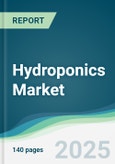Hydroponics, a soil-less farming method where plant roots are submerged in nutrient-rich water solutions, is gaining traction as a sustainable solution to address global food security challenges. The technique eliminates soil-related diseases and optimizes resource use, making it ideal for high-demand crops like strawberries, tomatoes, cucumbers, peppers, and lettuce. The market is propelled by the need to feed a growing global population, projected by the Food and Agriculture Organization (FAO) to reach 9.1 billion by 2050, requiring a 70% increase in food production from 2005-2007 levels. Urbanization and land degradation further drive adoption, as hydroponics enables high-yield farming in limited spaces, appealing to regions facing arable land scarcity.
Growth Drivers
Reduction in Arable Land
The decline in agricultural land due to urbanization and commercial development is a major driver. As traditional farmland diminishes, hydroponics offers an efficient alternative, requiring less space while maximizing crop output. This is particularly critical in developed and developing countries where competing land use and degradation challenge conventional agriculture.Increasing Investments
Significant investments are fueling market growth. For instance, large-scale hydroponic facilities are being established to meet rising demand for fresh produce. These investments focus on scaling infrastructure and integrating advanced technologies, such as automated nutrient delivery systems, to enhance productivity and sustainability. Hydroponics ability to use 95% less water than traditional farming further supports its adoption in water-scarce regions.Geographical Outlook
The USA is a key growth market for hydroponics, driven by rising demand for fresh vegetables, particularly salad greens and peppers. The increasing consumption of leafy vegetables and the shift toward vertical and profit-driven farming bolster market expansion. Favorable research and development in plant nutrition, coupled with the establishment of hydroponic farms, supports growth. The USA's focus on modern farming technologies to address food demand, fueled by population growth, positions it as a leader in hydroponic innovation. The Asia Pacific region is also expected to see significant growth, driven by urbanization and demand for sustainable farming in countries like India and China.Market Dynamics
The market faces challenges such as high initial setup costs and technical expertise requirements, which may limit adoption in some regions. However, opportunities abound in expanding applications for high-value crops and integrating smart technologies like IoT for real-time monitoring. Porter's Five Forces analysis highlights competitive rivalry and supplier dynamics, while regulatory support for sustainable agriculture enhances market attractiveness.Key Benefits of this Report:
- Insightful Analysis: Gain detailed market insights covering major as well as emerging geographical regions, focusing on customer segments, government policies and socio-economic factors, consumer preferences, industry verticals, and other sub-segments.
- Competitive Landscape: Understand the strategic maneuvers employed by key players globally to understand possible market penetration with the correct strategy.
- Market Drivers & Future Trends: Explore the dynamic factors and pivotal market trends and how they will shape future market developments.
- Actionable Recommendations: Utilize the insights to exercise strategic decisions to uncover new business streams and revenues in a dynamic environment.
- Caters to a Wide Audience: Beneficial and cost-effective for startups, research institutions, consultants, SMEs, and large enterprises.
What do businesses use our reports for?
Industry and Market Insights, Opportunity Assessment, Product Demand Forecasting, Market Entry Strategy, Geographical Expansion, Capital Investment Decisions, Regulatory Framework & Implications, New Product Development, Competitive Intelligence.Report Coverage:
- Historical data from 2020 to 2024 & forecast data from 2025 to 2030
- Growth Opportunities, Challenges, Supply Chain Outlook, Regulatory Framework, and Trend Analysis
- Competitive Positioning, Strategies, and Market Share Analysis
- Revenue Growth and Forecast Assessment of segments and regions including countries
- Company Profiling: Strategies, Products, Financial Information, and Key Developments among others
Global Hydroponics Market Segmentation
By Type
- Deep Water Culture
- Nutrient Film Technique System
- Aeroponics
- Others
By Input
- Growth Medium
- Nutrients
By Crop Type
- Fuits & Vegetables
- Herbs
- Flowers & Ornamental Crops
By Farming Type
- Indoor
- Outdoor
By Geography
- North America
- USA
- Canada
- Mexico
- South America
- Brazil
- Argentina
- Others
- Europe
- Germany
- United Kingdom
- France
- Others
- Middle East and Africa
- Saudi Arabia
- UAE
- Others
- Asia Pacific
- China
- Japan
- India
- South Korea
- Thailand
- Indonesia
- Taiwan
- Others
Table of Contents
Companies Mentioned
- General Hydroponics Inc.
- Hydrofarm LLC
- AmHydro
- Gardyn
- Fork Farms
- CropKing Incorporated.
- Freight Farms Inc.
- FarmBox Foods
- Hydronov
Table Information
| Report Attribute | Details |
|---|---|
| No. of Pages | 140 |
| Published | August 2025 |
| Forecast Period | 2025 - 2030 |
| Estimated Market Value ( USD | $ 13.3 billion |
| Forecasted Market Value ( USD | $ 19.86 billion |
| Compound Annual Growth Rate | 8.3% |
| Regions Covered | Global |
| No. of Companies Mentioned | 9 |









